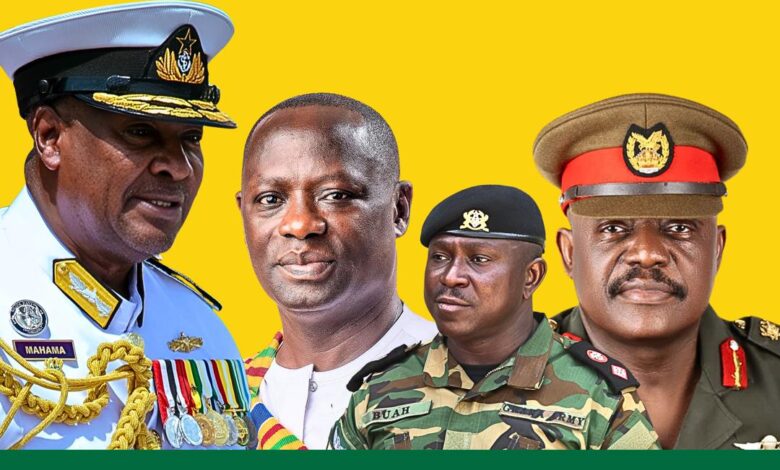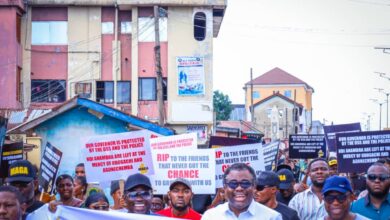Guarding the golden eggs II: The 3Ms of Ghana’s resource war—Kay Codjoe writes


This piece is a follow-up to Guarding the Golden Eggs: Why Ghana’s Military Must Redeploy to Defend Its Natural Wealth (see full article in the comments section).
The conversation it stirred was not merely about policy but about purpose, what the Ghana Armed Forces represent in a time when the nation’s greatest threat is not an invading army but the slow internal bleeding of its land, rivers, and forests.
For years we have chased galamseyers with sirens and slogans, yet the excavators keep returning like ghosts that refuse to die. What we face is not chaos but a coordinated structure, a shadow economy sustained by its own command.
At its core, galamsey rests on three pillars: Man, Machine, and Material. Man, the cartels, political patrons, and local protectors. Machine, the excavators, pumps, and above all, fuel. Material, the forests, rivers, and rocks stripped bare to keep greed alive. This triad forms the true center of gravity, the point where power, profit, and protection intersect. Cut one, and the system suffocates. That is where strategy, not slogans, must strike.
The fundamental structure here is national security. The chaos in our defence posture is part of the problem, not the cure. To protect the Republic’s wealth, we must start from the baseline that this is a security mission first and everything else follows.
National security is not only about borders, it is about guarding the sources of life. Ghana needs an interior operations grid, a belt of intelligence and enforcement linking air mobility to ground control. Mineral and forest corridors must be treated as defense zones. The army that can track insurgents should be able to track excavators. The same discipline that guards the flag should guard the forest.
Do we truly understand the combat power of the Ghana Armed Forces? If the Armed Forces say no to galamsey, there will be none. NAIMOS may coordinate civilian resources, but only the GAF possesses the integrated land, air, and water power to neutralise illegal mining nationwide. That is not bravado, it is constitutional fact and operational reality.
In that light, the recent successes of the National Anti-Illegal Mining Operations Secretariat (NAIMOS) deserve commendation. They have proven that with discipline, leadership, and lawful force, we can reclaim what we lost. But more must follow, because even the sea collects rain. Isolated victories are not enough; we need a steady current of resolve to cleanse the nation’s conscience like the rivers we seek to restore.
Every strategist knows that war is deception, and victory begins with breaking the opponent’s will. Galamsey persists because its risk is low and its reward high. The state must invert that equation. Let the cost of illegality exceed its comfort. “Before everything else, the people want food.” Galamsey feeds families where governance has failed. If the Republic does not replace hunger with hope, the pickaxe will always defeat the policy.
This is the clarity our Republic needs, to treat the protection of its natural wealth as a national security doctrine. Illegal mining threatens food, water, and order. By every measure, it is a national security emergency. Yet we fight it with committees, drones, and moral appeals instead of the full muscle of the state.
The Ghana Armed Forces already hold the capability required. Engineers can deny access. Aviation can monitor and interdict. Riverine units can secure waterways. What is missing is alignment, a decision that this battle sits within the defence portfolio, tethered to civilian authority but strategically led by the Armed Forces.
The GAF leads, civilian agencies complement. The soldier secures, the prosecutor prosecutes, and the planner restores. Civilian partnership must never become takeover, for bureaucracy cannot replace command discipline. If the GAF accepts the mission, the Republic must give it oversight and resources to win cleanly and hold permanently.
The defence of Ghana’s resources must rest on constitutional fidelity. Every deployment must respect rules of engagement, civilian oversight, and human rights. When soldiers act under lawful authority to protect the national estate, they do not militarise governance, they secure it.
We are witnessing a loss of control over our elements of national power, economic, moral, and environmental. The invader is not foreign, it is domestic. When we allowed excavators to invade our forests, we lost sovereignty and invited terror in the name of trade.
Even the cleanest command fails without conviction from the top. The same energy that sends troops abroad to defend oil in South Sudan should send them home to defend gold in Obuasi. We do not need another international mission to remind us of our domestic duty.
The Ghana Armed Forces are not just an institution of war, they are an instrument of order. If they sit idle while the Republic’s lifeblood drains away, our medals will gleam on a dying body. But if they rise to guard the resources that guard the nation, Ghana will find strength again, not in fear but in fidelity.
Because in the end, the equation is simple: a nation that cannot defend its wealth cannot defend its future. And if we cannot afford to defend our gold, our rivers, and our forests, then we cannot afford to call ourselves free.
DISCLAIMER: The Views, Comments, Opinions, Contributions and Statements made by Readers and Contributors on this platform do not necessarily represent the views or policy of Multimedia Group Limited.
DISCLAIMER: The Views, Comments, Opinions, Contributions and Statements made by Readers and Contributors on this platform do not necessarily represent the views or policy of Multimedia Group Limited.
Source link





